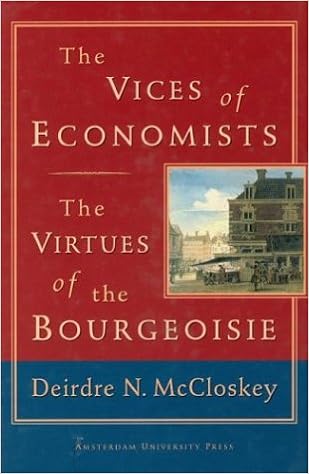
The author raises a profound question which the intervening years have done little to address. To paraphrase, the three vices Prof. McCloskey identifies are:
(1) The tendency of economists to confuse ‘statistical significance’ with ‘real-world importance’. The discussion is mostly technical, but the case for the damage done by this narrow but intellectually corrupting vice is compelling.
(2) The penchant among economists to focus on abstractions and treat economic issues as a species of mathematical brain teaser, instead of grounding their work in empirical reality. (McCloskey presents examples that resonate with my own experience as a fallen-away economics major.)
(3) The danger presented to real-life economies by ‘social engineering’. This point is not as empirically argued as the others (little evidence is offered beyond logic and economic axioms – which is the vice she’s just criticized), and indeed she presents no clear working definition of ‘social engineering’. That’s not a reason to dismiss the argument out of hand, but there’s thin factual support for it, and the bottom-line effect is to telegraph the author’s libertarian preferences.
Still, the main points of this critique remain relevant, though the impact of her argument is undermined by two of McCloskey’s personal tendencies.
The first is her condescending tone. She repeatedly refers to herself as “Aunt Deirdre,” and compares mainstream economists to little boys playing in a sandbox. Whatever her motives, this style is unlikely to win friends or influence people. Indeed, I couldn’t get past Chapter 2 the first time I tried to read the book.
Yet I’ve now read the book twice - all the way to the end (it’s only 130 pages) - because McCloskey is one of the few informed commentators willing to point to the moral hollowing out of Economics that’s taken place over the last 50 years or so – or really, since economists chose to enthrone Adam Smith’s Wealth of Nations as the foundational document of economic theory, and ignore the groundwork he laid two decades earlier in The Theory of Moral Sentiments. As McCloskey declares in the last paragraph of the last page, “We need economics to get back to the intellectual and moral virtues of David Hume and Adam Smith.” I agree with that conclusion.
Unfortunately, the second of McCloskey’s rhetorical tendencies works against the clarity of that diagnosis because of her insistence that the virtues economists should embrace are “scientific”. There’s no discussion of the scientific method, or clear definition of science. Instead we get: “Economics is mainly an observational science like astronomy or evolutionary biology or history itself.” (p. 25); “The astronomer who uses observations to try to work out how much one galaxy’s gravity affects another will in the end have to make a human judgment about whether the effect she calculates is big or not.” (p. 28); “In the physics department, by contrast, as in the engineering department or the history department, every question is quantitative.” (p.71); “The discussion of How Big is Big is what scientists spend their days doing, after measurement.” (p. 123)
None of these assertions are self-evident to me. Economic methods may, at their best, be observational, but that doesn’t make history and economics 'science'. Fiction writing, after all, is also observational. Science, it seems to me, seeks to demonstrate that hypotheses, and then more complex theoretical models, actually correspond to reality. Agreeing on relative standards does not really sit at the heart of that process. History is quantitative, and scientists spend all their time judging the bigness of things, only when you are wedded to the notion that Science with a capital “S” is the font of all human benefits.
What McCloskey is really concerned with, though, are human values such as prudence, freedom, liberty, and the arrogance of experts who presume to tell non-experts how to live their lives, rather than relying on “trust, conversation, and persuasion”. (This arrogance is what Adam Smith termed "the vanity of the philosopher".) McCloskey’s not willing to admit such issues lie outside the competence of science, so as courageous as her critique of the ‘vices’ of modern economics may be, she can’t bring herself to leap beyond the notion that economics must style itself as a science in order to offer virtuous insights. Smith and Hume were never so conflicted.
If you're open to overlooking such flaws, there are worthwhile insghts to be gleaned from this book. If not, you might go directly back to Smith's Theory of Moral Sentiments and consider what mainstream economics has missed by putting on the pretentions of an 'objective' science.
No comments:
Post a Comment